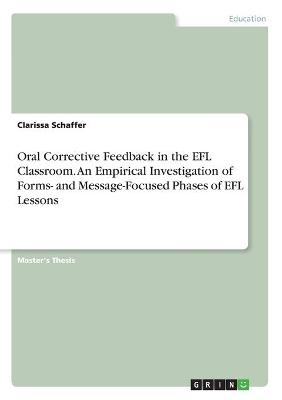
Oral Corrective Feedback in the EFL Classroom. An Empirical Investigation of Forms- and Message-Focused Phases of EFL Lessons
Seiten
2020
GRIN Verlag
978-3-346-23604-3 (ISBN)
GRIN Verlag
978-3-346-23604-3 (ISBN)
- Titel nicht im Sortiment
- Artikel merken
Master's Thesis from the year 2019 in the subject Didactics for the subject English - Pedagogy, Literature Studies, grade: 1,1, University of Bonn, language: English, abstract: This master thesis examines the research question "In how far is oral corrective feedback given in forms- and message-focused phases in the EFL classroom?" and is based on observations of three classes in year 5, three classes in year 7 and three classes in year 10 (10 h each). Information is given on the following sub-research questions: To what extent does oral corrective feedback take place in forms- and message-focused phases? What types of OCF are used in forms- and message-focused phases? To what extent does OCF take place in classes of younger EFL learners and in classes of older EFL learners in forms- and message-focused phases? What types of OCF are used concerning students of different ages in forms- and messagefocused phases? To what extent do teacher preferences concerning different OCF types exist in forms- and message-focused phases? "The greatest mistake you can make in life is to be continually fearing you will make one" (Hubbard, 1927). This statement does not only refer to the behaviour of many people in their daily lives, it does also especially refer to students in English as a foreign language (EFL) classrooms who rather do not participate during lessons than risk making an error or a mistake as they are afraid of losing their face (cf. Decke-Cornill & Küster, 2015). However, errors and mistakes are of high importance from a diagnostic point of view as they hint at the current level of students, their course of the learning process, their success or failure of their learning strategies as well as what type of support they might need (cf. Kieweg, 2007; Vetter, 2007; Haß, 2017). And even further, students are also in need of feedback to check their own ability in the foreign language and not to consolidate erroneous grammatical structures, vocabs or an incorrect pronunciation (cf. Timm, 2009). Hence, whenever an oral error or mistake occurs in the EFL classroom, teachers have to deal with the situation by deciding whether the specific error or mistake should be corrected or not and if so, how it should be corrected to support the learning process of the student without inhibiting him or her on an emotional level. Therefore, the topic of oral corrective feedback (OCF) is relevant for all EFL teachers and their daily practice in class.
| Erscheinungsdatum | 08.12.2020 |
|---|---|
| Zusatzinfo | 12 Farbabb. |
| Sprache | englisch |
| Maße | 148 x 210 mm |
| Gewicht | 146 g |
| Themenwelt | Sozialwissenschaften ► Pädagogik ► Schulpädagogik / Grundschule |
| Sozialwissenschaften ► Pädagogik ► Schulpädagogik / Sekundarstufe I+II | |
| Schlagworte | EFL Classroom • EFLClassroom • Feedback • forms-focused phases • forms-focusedphases • message-focused phases • message-focusedphases • OCF • Oral Corrective Feedback • OralCorrectiveFeedback |
| ISBN-10 | 3-346-23604-8 / 3346236048 |
| ISBN-13 | 978-3-346-23604-3 / 9783346236043 |
| Zustand | Neuware |
| Informationen gemäß Produktsicherheitsverordnung (GPSR) | |
| Haben Sie eine Frage zum Produkt? |
Mehr entdecken
aus dem Bereich
aus dem Bereich
für Kinder mit Down-Syndrom, Leseratten und Legastheniker
Buch | Softcover (2023)
Lehmanns Media (Verlag)
CHF 27,90
Grundlagen und Praxis
Buch | Softcover (2022)
Beltz (Verlag)
CHF 27,90
wie Lehrer, Eltern und Schüler guten Unterricht gestalten
Buch | Softcover (2024)
Klett-Cotta (Verlag)
CHF 33,55


